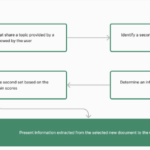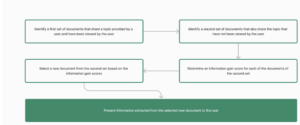When AI meets SEO
Adapting to technological advancements like AI is necessary for SEO professionals, as AI empowers businesses to streamline processes and achieve better results, and professionals who don’t embrace this technology may fall behind the competition.
To remain competitive in the ever-evolving SEO landscape, professionals must adapt to and utilize AI tools. However, choosing the right tools can be daunting. Read on to learn how to up-level your SEO game with AI.
Understanding the role of AI in SEO
SEO professionals specializing in AI leverage AI tools to optimize website visibility. They understand the many AI tools available and their strengths as they pertain to the various aspects of SEO.
Such tools automate tasks like identifying high-value keywords, generating content outlines, and analyzing backlinks. AI tools also streamline website auditing and competitor analysis, providing actionable insights for better decision-making.
Through AI, SEO specialists can work more efficiently and swiftly adapt to dynamic search engine algorithms, ensuring sustained online visibility and growth.
Choosing the right AI tools for your SEO needs
No single-solution AI-powered SEO tool yet exists. Rather, professionals use specialized AI tools to perform various tasks.
Popular options include:
- Content optimization tools — These tools analyze and enhance digital content like blog posts and static web pages to improve search engine rankings and user engagement. Examples include:
- Surfer SEO — provides competitor content analysis and a data-driven approach to improving search rankings. It also analyzes on-page content and features a relevant keyword generator and other research tools.
- Copy.ai — generates creative and persuasive copywriting focused on SEO content creation and optimization.
- Clearscope — offers comprehensive keyword analysis by search intent analysis. Suggests topics, themes, common questions, and optimized headers for content.
- Jasper — focuses on data privacy, multimodality, and efficiency to improve enterprise-level workflows.
- Keyword research tools — Using AI to analyze search engine data, these tools identify relevant keywords and phrases related to a particular topic or niche. They also provide insights and suggestions to help you select the most effective keywords for your content.
Many quality keyword tools exist, including:
- Ubersuggest — distinguishes itself with an intuitive interface for a seamless workflow.
- Keyword Insights — generates and organizes thousands of keywords into manageable groups with honed insights.
- Quattr — creates technical insights and detailed reports highlighting trackable improvement opportunities.
- Backlink analysis tools — By scanning the web to identify and compile all backlinks pointing to a particular website, these tools provide insights into the quality and quantity of backlinks. Such tools include:
- Semrush — has a specialized Backlink Gap tool highlighting opportunities for improvement in your backlink profile.
- Ahrefs — supplies robust site auditing features and competitor backlink research.
- BuzzSumo — updates links around the clock and provides instant alerts for timely action.
- Rank tracking and reporting tools — These tools automatically track keyword positions, identify trends, and provide insights into rankings. Additionally, they generate detailed reports with actionable recommendations for optimizing SEO.
Popular tools include:
- Moz Pro — integrates with many third-party apps and hosts robust community resources.
- Rank Tracker — stands out as downloadable software that combines unlimited keywords and real-time reporting.
- SE Ranking — delivers a comprehensive suite of SEO tools, offering a holistic approach to website optimization for businesses of all sizes.
When selecting tools, consider your specific goals and budget to determine the best fit. Some tools offer free versions or trial periods, allowing you to test them before committing.
Optimizing content with AI
AI tools analyze content by examining factors like keyword density, readability, and relevance. Tools like Surfer SEO and Clearscope use AI to suggest keyword optimizations and content structure improvements, streamlining content creation and enhancing SEO effectiveness.
However, it’s worth noting that Google does not prohibit AI content but asks webmasters to work with human editors and fact-checkers to review it for originality, relevance, and helpfulness before adding it to their websites.
Keyword research and analysis with AI assistants
AI enhances keyword research by analyzing vast datasets, much faster than a human can, to identify high-performing keywords with minimal competition. AI assistants can instantly provide keyword insights by processing user questions and generating relevant suggestions.
For example, if you ask ChatGPT or Gemini to supply a list of keywords related to the “best SEO tools,” the assistant can do so instantly. Then, you can request ChatGPT to provide relevant insights into each listed keyword as it pertains to your intended audience, content niche, or direct competitors.
Utilizing AI for backlink analysis and competitive research
Tools like Ahrefs and Moz Pro analyze backlinks and competitor strategies. This can help you improve backlink acquisition and boost website authority and search engine rankings.
The benefits of AI for in-depth backlink analysis also include faster data processing and the automation of repetitive tasks. Using AI results in more timely insights and frees up you and your team to focus on creative, strategic planning.
Increasing efficiency with automation
By automating repetitive tasks, like keyword research and performance tracking, SEO tools like Semrush and Ubersuggest allow professionals to spend more time considering factors outside the scope of AI tools, such as upcoming industry events or product launches.
This facilitates a refined content strategy. With more time to focus on high-level SEO, resources are allocated more efficiently, and decision-makers are better informed. Ultimately, this leads to more effective SEO strategies.
Harnessing AI for data-driven insights
Data-driven decision-making is crucial for SEO. AI increases the scope of data that can be analyzed and the speed at which it is done.
Data is at the core of SEO. And data accuracy is vital. AI tools can analyze vast datasets efficiently, uncovering patterns, trends, and correlations humans may overlook. By processing this data and providing key insights, AI enables professionals to make better-informed decisions on keyword targeting and content optimization.
Case studies and success stories
Many businesses report positive results achieved through AI implementation in their SEO strategies.
Several examples include:
- STACK Media — experienced a 61% increase in website visits and a 73% reduction in bounce rate after using AI to improve keyword and competitor research.
- Glasses.com — saw a 26.38% increase in clicks and a 34.16% increase in year-over-year orders after implementing AI tasks to improve content and linking.
- Transitapp.com — grew organic traffic by 1,134% using AI to write meta titles and descriptions as part of its SEO strategy.
- TV 2 FYN — recorded a 59% increase in click-through rates using ChatGPT to generate article headlines.
- Harper College — used Gemini to generate web copy, resulting in an overall increase of 76% in site clicks.
Best practices for integrating AI into your SEO strategy
Incorporating AI into your SEO strategy requires planning and a little technical savvy.
Here are tips for getting the most out of it:
- Understand your needs — Identify specific areas in your SEO workflow where AI tools can add value.
- Start small — Integrate AI into one aspect of your SEO, such as keyword research, before expanding to other areas.
- Research AI tools — Explore the various AI-powered SEO tools available. Test them out and choose options that align with your goals and budget.
- Retain the human element — AI doesn’t replace human expertise. Professionals can interpret data and strategize in ways AI cannot.
- Analyze and adjust — Regularly review the performance of the AI tools you use.
- Stay updated on AI trends — Keep abreast of emerging tools and product updates, like Google’s Search Generative Experience (SGE), which enhances search results by employing generative AI content. Such changes can drastically alter how organic search works and the effectiveness of existing SEO strategies.
Step into the future of SEO
AI streamlines processes and optimizes repetitive tasks, enabling professionals to use their time more effectively and focus on high-level SEO strategy. As such, embracing AI technology is the path to improved SEO performance.



















